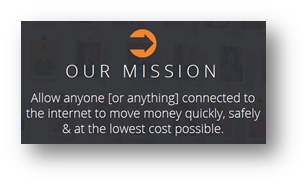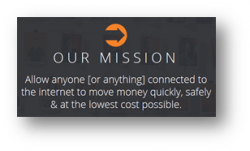Dwolla Suspends Bitcoin: The On Ramp is Closed!
I recently came on an interesting article by an economics student. The clearly anti-Bitcoin author noted a few of the common criticisms of Bitcoin before launching into her big finale. She claimed that even if Bitcoin where to supplant fiat and become the everyday currency for stores and restaurants, it would give merchants endless headaches since they could never know what the true value of Bitcoin is.
I live in Japan and have lived through times when the yen was as high as 145 and as low as 90 to the dollar. This wildly fluctuating exchange rate did, in fact, cause me problems, just not on a day-to-day basis here in Japan. As a transactional currency, the yen was stable and most of the merchants wouldn’t have even known about the exchange rate. If I hadn’t been wiring money home, I wouldn’t have cared either.
So, if Bitcoin became the currency people use in their everyday lives, there would be little problem with its volatility since a) it probably wouldn’t be as volatile at that point, and b) on a transactional level it would be much more stable than on a cross-currency level.
If the author of that article had shifted her focus just a little, she would have been able to hit a far more fundamental problem of cryptocurrencies—how to move money between virtual currency and fiat.
This problem has been underlined in the last few months by a spattering of stories detailing banks closing the accounts of patrons who are even tangentially related to Bitcoin. And it is not just banks, but PayPal is very leery of Bitcoin, Paxum e-Wallet has suspended any Bitcoin related activity, and Dwolla, after tightening up its policies on Bitcoin over the last year has finally announced that they will no longer do business with any entity involving Bitcoin.
Some have claimed that this is the result of the government trying to strangle Bitcoin in its crib. Maybe, but probably not. There are a lot of simpler reasons that businesses might be acting this way without going to extremes.
First and foremost, Bitcoin is new, unknown, and with unknown risks. It doesn’t help that a lot of the news surrounding Bitcoin has on the one hand been about criminal activity and on the other about fringe political groups. It also doesn’t help that governmental response to Bitcoin is largely unsettled. Is it worth the risk of being involved in Bitcoin is that means that the bank or institution will be painting itself with a target for greater scrutiny? Probably not.
Next is the fact that Bitcoin is disruptive and would likely compete with the profit centers that these banks and institutions rely on. Bitcoin, if successful, has the potential to replace many savings accounts, debit cards, international wire transfers, etc. It would radically alter the way banks have to operate if they expect to remain in business. Additionally, compared with the volume of money that the banking system deals with on daily basis, Bitcoin is a gnat barely worth its attention.
Since Bitcoin has had difficulty working directly with banks, businesses like Dwolla, PayPal, and Paxum seemed like they could bridge the gap between Bitcoin and fiat. But these businesses are no different than the banks: concerned about regulation and competition. For payment systems like these, Bitcoin is even more a direct competitor. If the Bitcoin-fiat exchange problem once got solved, there would in fact be no need for any of them.
Take the case of Dwolla: it is essentially an e-wallet and touts itself as being in the cash business. You have to transfer money into your Dwolla account, which may take days since they use the ACH system, and then you can really only interact with other people/businesses that use Dwolla. You can send money to non-Dwolla users, but the payment comes with an email instructing that person to sign up in order to collect their money. Milne is clearly hoping that a network effect will flip a huge number of people from PayPal to Dwolla because of its low fees.
Compare that with Bitcoin. One of Bitcoin’s big problems is being able to deal with banks, but this is  also true for Dwolla. They have only inked contracts with 16 banks and will have to get many more banks onboard before they can really take off as a competitor to PayPal.
also true for Dwolla. They have only inked contracts with 16 banks and will have to get many more banks onboard before they can really take off as a competitor to PayPal.
Removing that obstacle, Bitcoin can be sent for pennies, to anyone, anywhere, for any reason. Dwolla’s mission statement may state that they can do that, but the fact that they are refusing to do business with Bitcoin proves the lie.
In the age of Edward Snowden, this is really a key advantage of Bitcoin. Wikileaks would not exist if only e-wallets like Dwolla existed to service it. And at a time when governments are becoming ever more secretive and oppressive, having a way to transmit value freely without the fear of interference from a too controlling government is crucial.
Milne commented on his blog few months back about the very broad FinCEN guidance that was issued earlier this year. FinCEN mandated that anyone exchanging Bitcoin for fiat could be called a money transmitter and be required to register with FinCen and to comply with the money transmitting laws of each individual state—a huge burden. Milne commented that “That’s a 10MM dollar problem for any platform who is a money transmitter by definition. Virtual currency just turned into a ‘no amateurs allowed” business in the United States.”
In Milne’s estimation, this is all about how we move money around. He is right, but only to an extent. In a perfect world, Bitcoin would not be needed and might not even have been thought of. The virtual currency space would have been filled by Amazon, Facebook, or Dwolla. But in a world where banks act illegally with impunity, where the middleclass is crushed financially and oppressed politically, and where the government is taking on an Orwellian character, Bitcoin is so much more than moving money around. It is taking back the power.
Milne claims to be agnostic about Bitcoin, and at some level, I don’t doubt he is. His payment system has strength, and the reason that Dwolla says it chose this moment to kick all the bitcoiners off its rolls seems reasonable from a business standpoint. They claim that Bitcoins were used by only a very few people, about .01 percent, and that these transactions took up an inordinate amount of resources. Dwolla is about to go through a growth spurt and they don’t want to divert there resources to this risky, fledgling currency any more.
There is no doubt that Bitcoin needs to solve its exchange problem if it is really going to succeed. On the other hand, banks, payment systems, and governments reaffirm the need for alternate ways of thinking about money, and governance, every day.
Bitcoin Warrior is dedicated to promoting Bitcoin. If you know a business or organization that deserves to be profiled, please let us know at [email protected]. Also, please a comment. We love hearing from you.
